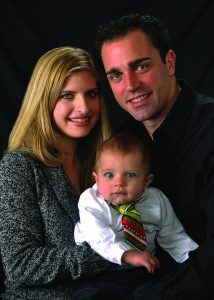After three years of marriage, Tom and Sharon were excited to start a family. Though Sharon didn’t get pregnant right away, the couple tried to remain optimistic. Eight months later, their optimism waned.
“I figured I was the issue,” recalls Sharon, 33. “Once I was in the clear, they did a sperm analysis and found out my husband’s sperm had low motility.”
“I was surprised, and tried to figure out how and why,” says Tom, 32. “It was very difficult emotionally. It was upsetting and deflating. As a man, this shouldn’t happen. You’re supposed to be strong, but you’re forcing your wife to go through all the pain, the trouble, the shots, and you just sit there.”
“It’s difficult for men to accept,” says George Taliadouros, MD, director of the Delaware Valley Institute of Fertility & Genetics. “Women are more practical in trying to find a solution. Luckily, the men overcome this difficulty, because there’s always a solution. Very few times we have men who do not have any sperm. In that case, we direct them to a donor sperm program.”
Though it took Tom and Sharon 14 months, they ultimately conceived through in vitro fertilization (IVF) and intracytoplasmic sperm injection (ICSI) and became pregnant with a son. A couple years later, they repeated the procedure and welcomed baby number two.
“Through all the trouble and all the work, all the ups and downs, it was well worth it,” says Tom. “It’s behind me. I don’t think about it anymore. Once she was impregnated, that’s it, back to normal.”
Though doctors were unable to diagnose the cause of Tom’s infertility, for many men, environmental and lifestyle factors play a role.
“One in 10 couples suffer from infertility and in 40 percent of those cases, it’s due to a male factor,” says Oumar Kuzbari, MD, fertility specialist at South Jersey Fertility. “There are many explanations and causes, including abnormal sperm production, blockages that can prevent the delivery of the sperm, infection, trauma, injury to the testes, cancer treatment and hormones.”
When it is proven that the woman should have no trouble conceiving, doctors evaluate the man. In addition to a complete examination of his sperm, he is asked about medications, environmental exposure and other lifestyle factors.
“One of the biggest things today is testosterone supplementation,” says Louis Manara, DO, director of the Center for Reproductive Medicine & Fertility. “We all believe that we should perform sexually at a certain level, and we should have a certain amount of desire. When a man fails for whatever reason to meet his expectations, he seeks assistance from his physician.”
Often, doctors discover the patient has low testosterone and prescribe testosterone supplements, which “have the capacity to profoundly suppress and shut off sperm production,” says Manara. “During the reproductive years, the use of testosterone has to be done very, very carefully and only when absolutely necessary. While the problem is generally completely reversible, it may take several months.”
Alcohol, cigarettes, recreational drug use, stress and poor diets may also be respon- sible for male infertility.
“Stress is also a big factor. Being infertile causes stress and stress causes infertility, but other stresses, such as people working a tremendous number of hours, not resting and not eating well, also contribute.”
Diets with few or no antioxidants, which are necessary for sperm production, can have a negative impact, so Manara recommends that men hoping to impregnate their partner take a multi-vitamin rich in antioxidants.
“Obesity also has a major role in affecting sperm count, as well as decreased libido and erectile dysfunction,” adds Kuzbari.
Cancer treatment is another cause for male infertility. Five years ago, at just 23, Greg Custer was diagnosed with testicular cancer. He had surgery to remove the tumor, followed by radiation. He was also advised that he’d likely be unable to conceive after treatment, and banking his sperm would be prudent.
“Being 23 years old, kids weren’t something in my immediate future, so I wasn’t really thinking about the results of the sperm testing,” recalls Greg, who lives in Moorestown. “I wanted to worry about my immediate health rather than the long-term of having kids, although I knew at some point I would want to have kids. I was going through so many tests at the time anyway that doing the banking wasn’t a big deal.”
Greg banked his sperm in the SEEDS (semen, embryo and egg depository and storage) program, and in June 2010, Greg married Talia, who had been by his side throughout his treatment.
“SEEDS is for cancer patients who hope to attempt pregnancy,” says Taliadouros. “It is difficult for a patient to think of anything beyond treatment and survival. But more and more, men and women are realizing that there is another factor to consider – their fertility. Whether or not the cancer affects the reproductive system directly (such as cervical or testicular cancer), radiation and chemotherapy treatments can have serious consequences on future fertility.”
“We were told we had less than a half-percent chance of it working, so we jumped right into the IVF,” says Talia, 28.

Talia and Greg Custer conceived their son Wyatt through in vitro fertilization
“I was a little skeptical, and what bothered me the most is that I saw it as my problem, but Talia had to go through all of the injections and put her body through the rigors,” admits Greg. “I didn’t have the physical consequences, but administering the injections into her and supporting her emotionally – it was a lot to deal with.”
Today, the couple is the proud parents of Wyatt, 18 months old, with another baby boy on the way.
“What she had to go through is something that will always stay with me, but I think the end result is all worth it,” Greg says. “Wyatt is the joy of our lives.”
While IVF and ICSI are the most widely used methods to help couples conceive, new technology is being studied.
“One area of interest is selecting the sperm most likely to fertilize an egg normally and form an embryo,” says Manara.
“We have made great advances in the management of male infertility,” he adds. “Today most men with low sperm counts are able to achieve successful pregnancies through the use of assisted reproductive technologies.”














